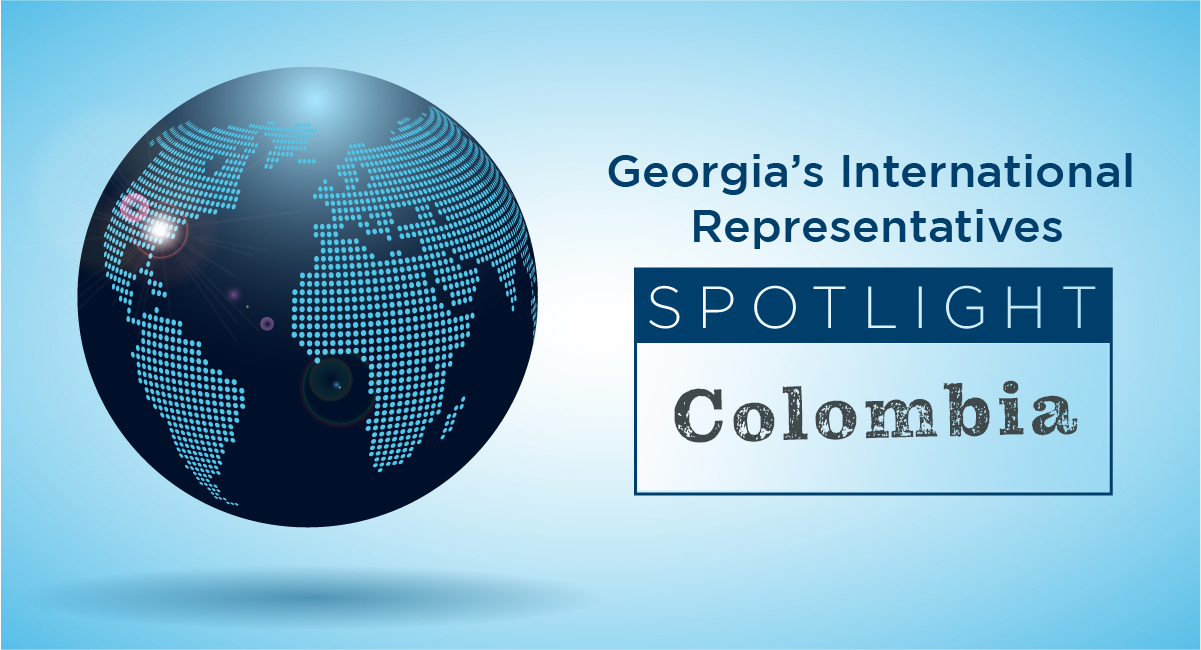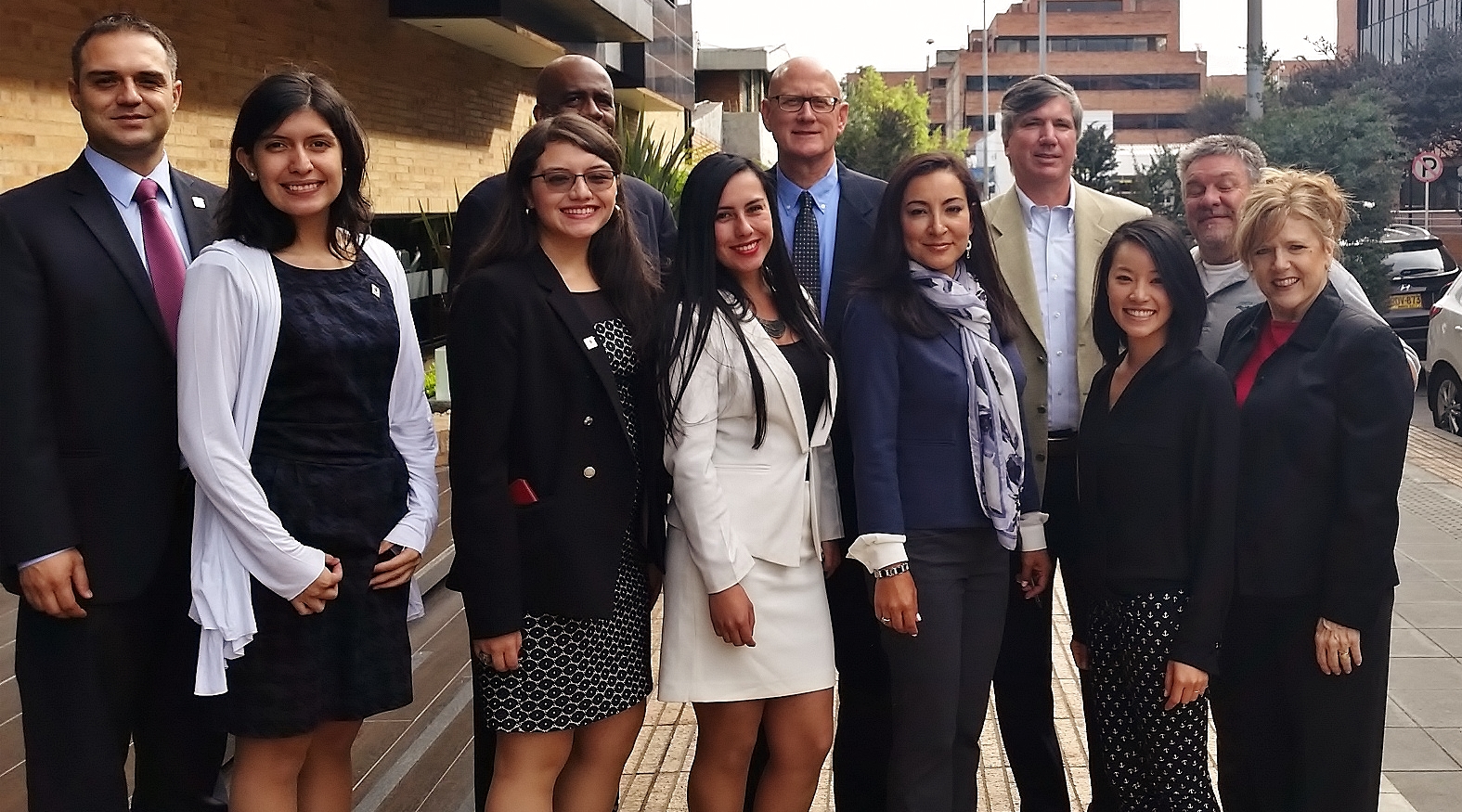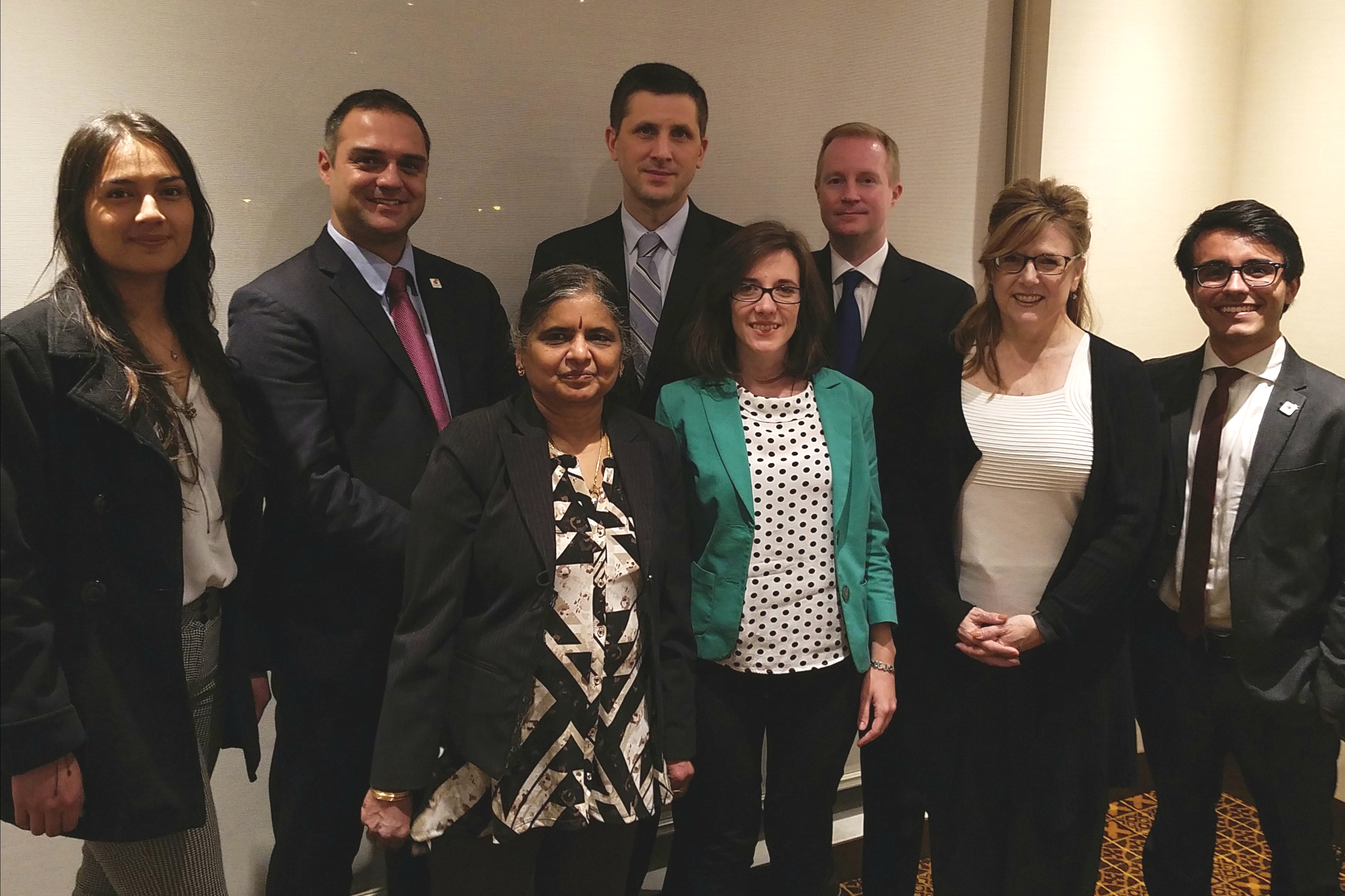International Representative Spotlight: Colombia

International Representative Spotlight: Colombia

Interviewee Name and Title:
Juan Carlos Lopez, Managing Director
With a population exceeding 50 million, Colombia has the second-largest number of consumers in South America and the third-largest economy in the region overall. The State of Georgia opened its Colombia office in 2013 due to the country’s increasing importance as a trade destination for companies looking to expand their business to Latin America. Since the US-Colombia Free Trade Agreement was signed in 2012, Georgia exports to Colombia have grown by more than 20%, and the South American nation has been recognized as being a strategic place to conduct business, having both strong macroeconomic stability and favorable long-term growth prospects.
Where is the office located: Bogotá, the capital city of Colombia.
Who are the team members: : Our Colombia team has 2-5 members, with more on demand as needed.
How did you enter the world of exporting/trade and how long have you been working in this field?
Juan: I’ve been working in the field since 2003, when I started working with a company that provided consultancy and market reach strategies for different countries. At this job, I had the opportunity to live and work in Kenya for a while, primarily working with agribusiness. I actually consider my “graduation” into exporting and trade to be during my time in Kenya. In August 2005, I was working on shipping a Kenyan company’s first container of macadamia nuts when we ran into some logistical issues. Me and my team had fully loaded a shipping container and were preparing to send it to be shipped; however, when the container was set to head out, the truck that was carrying it broke down while trying to go up a hill. We had to decide whether to unload half the truck and make multiple trips or push the truck up the hill--we chose to push it. It was a very unique way to enter the world of exporting and is a fun story to share. All that being said, I’ve been in the exporting and trade world since 2003.
What typical services do you provide for Georgia exporters interested in your market?
J: We mainly provide market assessments and research to companies that have shown interest in exporting to Colombia; however, we provide these services both to companies interested specifically in the Colombian market, but also to companies that are targeting Latin America in general. Colombia is a representative market and understanding the potential of a product or service in Colombia is crucial if companies genuinely find the Latin American market to be of importance to them.
We can also assist companies with a business partner identification (BPI). Through a BPI, we help identify local partners, clients, and end-users who may have an interest in the Georgia company’s product or are interested in developing the Colombian market with the Georgia brand. Generally, in a BPI, we’ll reach out to 20-25 companies in Colombia who may be interested in partnering with a Georgia company. We’ll present information about the Georgia company, discuss the company’s products or services, and ask if the Colombian company would be willing to engage and connect with the Georgia business.
Many times, we’ll also provide answers or solutions to specific questions and issues that Georgia companies may face. This might be because of an item that the Georgia company needs to expedite, because of a situation that needs clarification, or because the company needs help resolving a market problem.
What do you consider the biggest challenge(s) to exporters interested in Colombia? What is the greatest opportunity?
J: Colombia is full of interesting challenges, many unique to Colombia, but some similar to other regions. The biggest challenges are the language barrier and the currency exchange rate. Only 3-4% of people in Colombia speak English; and although it’s common to find a business that has at least one person who speaks English, most decision makers inside the company won’t speak English themselves. That plays a big role in business decisions, because often times a decision maker will need and want to understand what happened, know what was said and discussed, and be able to read any materials, all of which will need to be in Spanish.
The other challenge is the exchange rate, which fluctuates a lot here. From August to October, the exchange rate fluctuated almost 6%; so, the cost of products in August was 6% higher than it was in October. When you have those types of fluctuations, having specific dates or volumes to purchase your products becomes very relevant—6% makes a huge difference! Throughout the year, we can experience up to 2-digit fluctuations which can make conducting business tricky.
Aside from those two main challenges, we also need to consider a few others. Transportation and logistics are two of these that need to be included in costs. Colombia’s infrastructure, especially road infrastructure, has a lot of capacity issues. Getting cargo from the port to central Colombia can cost almost the same amount of money, if not more, than shipping the product from the US to the port. Roads may also be closed due to rains or other issues, sometimes for a day or more. Understandably, this can create issues.
In terms of opportunities, Colombia is unique in South America due to its easy access to the Caribbean, and ports on both the Atlantic and Pacific Oceans. As a result, Colombia has become a relevant market entry point for other South and Central American countries and there are many things here that help facilitate access and opportunities to other Latin American markets. Colombia is the 3rd largest economy in South America, and we are recovering well from the COVID-19 recession. While Colombia isn’t the easiest country to do business in, there are a lot of great opportunities here, especially for US companies.
Colombia is truly a US-oriented market that is keen on and open to American products. The US is Colombia’s largest trade partner, with 24% of all imports in Colombia originating in the United States. The US and Colombia also have had a free trade agreement since 2012, which has improved the trade relationship between the two countries. As a result, many products from the US are tariff free. In 2022, more products will become tariff free, which is a huge advantage against similar products from Europe or China.
There are also industrial market opportunities. The post-COVID market reactivation has evolved in very interesting ways. For instance, there are certain industries and regions that have reported high rates of productivity and have requested the manufacture of specific products that exceed numbers from the past 10 years. There is a need for technology, equipment, and raw materials. Some of these are already coming from the US, but there may be opportunities for other products.
Likewise, the tech industry is another great opportunity. Tech is driving the world, and companies in areas like the City of Medellín are leading in solutions for blockchain, FinTech, and cybersecurity. As a result, many foreign companies from the US and elsewhere are finding partners in Colombia to distribute and deploy their products in Latin America.
Finally, due to Colombia’s geography, there is a strong commitment to developing infrastructure, such as roads, seaports, and airports. This has been on the legislative agenda for several years, and companies have recently received additional support over the last year to expedite the development of these types of infrastructure. This is another great opportunity for a company to provide equipment, vehicles, services, and other materials.
Are there any trends, be it in policy, culture, or consumption habits that exporters should be aware of when considering the market?
J: Colombia is price-driven, and the price of a product is sometimes more important than its demand. People are more conscious of the price tag than they are about quality or capabilities, especially if you can get it at a discounted price. This should be considered, as shipping, logistics, and a 19% value-added tax can lead to an increase in the price of your product in Colombia.
There are also certain trends going towards green energy and sustainability. Colombia has an incredibly varied ecosystem, spanning from rainforests in the Amazon to tall mountains to picturesque beaches. As a result, there is increasing demand for products that are sourced from plants, animals, and other materials that are unique to Colombia. On that same note, many regulations are centered around preserving geographic and ecological diversity, and they incentivize investment in green energy and the materials needed for solar panels, hydropower, biomass, and similar products.
Likewise, there’s a strong emphasis on getting regulations on par with the requirements set by the Organization for Economic Co-operation and Development (OECD). Colombia was recently accepted to the OECD on the condition that Colombia would implement best practices in trade, regulations, and the like. There is a speed to facilitate trends, discussions, and negotiations with more international reach rather than just focusing on local trends.
Colombia’s historical internal conflict should also be considered when thinking about entering the market. Colombia is known for struggling with narcotic traffic and guerrilla militants (FARC). Despite this, the government has taken great steps to facilitate and expedite peace. Recently, the government signed a peace agreement with FARC, and there is a lot of capital and investment put towards ensuring peace. It’s been challenging, but everyone involved has a significant interest in keeping the peace process going. Importantly, Colombia has changed and is continuing to change: a lot of policies have been put into place to end violent conflict, stop the narcotics trade, and open the door for new opportunities. This is all helping to open clear paths for trade by ensuring that companies won’t have to struggle with some of the issues that existed in the past.
What advice do you have for companies looking to start exporting to your market?
J: It’s important to get a feel of the market and what will be needed for your product before you start selling here. The Colombian government is very open with information, and you can find a lot of information online. Bogotá is a short flight from Atlanta, and is in the same time zone, so you should take the time to get a feel of the market in person.
Relationships and friendships are sometimes more important than professional or business relationships, so asking after people’s personal lives is very common as an initial part of the conversation. You might have one meeting scheduled to last an hour, but you spend the first 5-10 minutes talking about personal things like family, friends, sports, news, and other things.
Likewise, meeting with partners face-to-face or virtually is very important, especially considering the short flight, wealth of potential here, and relational focus. With the pandemic, Colombia has become very open to virtual meetings which has made it easier to close deals, but it’s still important to be able to shake hands in some way.
When considering the Colombia market, you also need to have marketing materials in Spanish and have the ability to reply to questions or service requests in Spanish. Understand that there may be certain regulations on products that require clearance for buyer security protocols, and there may be some costs associated with this.

Tell us about a memorable time when you were able to help a Georgia company avoid or overcome a major pitfall in your market? What was the situation and what do you want other companies to learn from this?
J: There is one interesting situation we faced with a Georgia-based chemical company. Our client was contacted by a Colombian company to buy some products, but the request was strange. The Georgia company asked us to vet the case and see if the request was real and by a reputable company. We were able to help our Georgia client determine that the request was real. It was actually from the second largest company in Colombia! The Colombian company wanted to negotiate a long-term contract, so we worked with the two companies to get a trial contract which could then be followed by a longer-term relationship.
The negotiations got quite tricky because of the documentation and information requirements from the Colombia company. They were asking for a lot of detailed information, and our clients in Georgia didn’t understand why it was all needed. However, we were able to facilitate a discussion that revealed that the Colombian company needed the information to ensure they complied with Colombian regulations against money laundering, narcotics contamination, and fraud, among other things. It’s important to understand that the Colombian government asks for a lot of information which sometimes makes companies uncomfortable; however, this information is necessary to get the registration needed to be able to sell in Colombia. From that perspective, we were able to explain these requirements to the Georgia company and also help the Colombian company understand US business practices and expectations, which helped both companies overcome the complications. The Georgia company was eventually able to get everything sorted out, and they provided enough information that demonstrated compliance both with Colombian national regulations and the partner company’s internal requirements.
It took several months to take care of everything and start shipping goods, but it is a good example of how GDEcD’s Colombia office was able to facilitate conversations and help negotiations be successful.
There is another example with a tech company based in Georgia. This client was trying to work with a government-owned oil company, but they were having trouble getting into contact with company representatives. Due to the networks and relationships GDEcD’s Colombia team has developed over the years, we were able to supply valuable contacts and other information to the Georgia client. Excitingly, our client has now signed an initial contract with the oil company and we’re very proud that we were able to facilitate that.
What has been your biggest export achievement?
J: I’m very proud to have been a part of many success stories over my career; however, one of my proudest achievements is with a Georgia company we helped. This company typically had transactions of somewhere between $40,000-50,000, but we were able to introduce them to a new distributor in Colombia that drastically increased their sales numbers. We helped to facilitate a discussion between the two companies in Atlanta, and the contract resulted with an almost $500,000 deal with the new distributor. This was very exciting, and I’m proud to have been a part of this success story.

What made the most impression on you when you visited Georgia?
J: The airport was huge, and I was impressed at how far I walked after getting off the plane!
I was also impressed by the weather in Georgia; it was winter when I visited Georgia the first time, and it really caught my attention that the Georgia winter wasn’t all that cold. I really don't like the cold, so that was a very nice surprise.
Last time I was in Georgia, I also got to visit the Savannah port which was spectacular. It’s interesting because the port isn’t quite on the ocean and is instead on the Savannah River. Everything that’s happened there over the years, including the improvements and expansions, is very exciting. To see the port and the size of operations there was incredible.
What do you enjoy most about representing Georgia in Colombia?
J: Georgia is the only state with an office in Colombia and taking the lead in that is fun. We get to discuss what GDEcD does with different government ministries and economic associations and explain why we are relevant. Colombian officials don’t necessarily know the difference between the Georgia office and the US Commercial Service or US Embassy, so it can be a challenge to explain that to them; but it is a great opportunity to talk about Georgia and how the state is both a close partner with many Colombian businesses and is named the top state in America to do business with. Additionally, having the chance to meet with people in Georgia and help position Georgia companies to be successful in Colombia is fun and interesting.
What do you think would most surprise Georgians to learn of Colombia?
J: People are very open and kind, and they like to introduce you to everyone they know. It’s a very warm and welcoming culture, and Colombians are very kind to Georgians. Some Georgians might be surprised at how cheap things are here compared to the US, and that can really catch the eye.
The altitude might also catch some Georgians off-guard. Except for parts of North Georgia, the state is mostly sea level—but the Colombian capital of Bogotá is 2600m (about 8650 ft.) above sea level. This can be a huge adjustment for Georgians visiting for the first time.
The climate and geography of Colombia is also quite varied, so you can go 30 minutes from Bogotá, which is in the mountains and year-round has temperatures of 50-60 degrees F, to a region that has temperatures averaging from 70-80 F. And, in just an hour from Bogotá, you can get to sea level which is more tropical. This might surprise some Georgians.
###
Are you a Georgia business looking for help growing your international sales? Find out how Georgia’s International Trade Team can help at www.Georgia.org/Trade.
